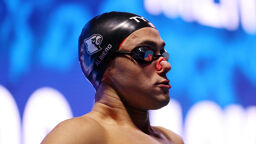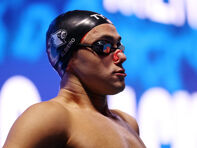Our friend Jon Holmes of Sky Sports paid Outsports the ultimate compliment this month, by bringing his readers the stories of out lesbians for Lesbian Visibility Week in the style that co-founders Jim Buzinski and Cyd Zeigler have employed for more than 20 years: giving LGBTQ athletes the platform to share their stories, in their own words. “Courage Is Contagious” all over the world, no less so in England’s county of Devon, where Jon found swimming coach and out proud lesbian Emma Collings-Barnes.
According to Jon, the school where she coaches, Mount Kelly, has a swimming program that is one of the most successful in the U.K., having produced more than 80 international athletes, many of whom have competed at the Olympic and Paralympic level. As a young athlete herself, Collings-Barnes represented Great Britain in 5000m Open Water Swimming before moving into coaching.
Here is Emma Collings-Barnes, in her own words:
I live my best life because of swimming, and facing the challenges that being a female coach presents.
I live my best life because I’m a lesbian, which brings its own challenges in society.
And I live my best life for my best friend Katie.
As a young athlete, I felt defined by swimming and my sexuality. However, I was deeply in the closet which meant that when I retired from competition, I felt a huge void.
I considered going into physiotherapy, but due to that ongoing struggle with myself, I chose coaching. The thought of having a positive effect on the lives of others was exciting to me.
I now lead one of the best programs in the country with 150 swimmers and eight coaches – but getting here has been a battle, both internal and external.
That battle has made me a better coach. I’m now more patient, level-headed, and understanding. In recent years, I’ve had my first real success at elite level, with Federico Burdisso becoming the youngest male in history to win a medal at the European Championships. He claimed 200m butterfly bronze in Glasgow in 2018 when still aged 16; last year, he was fourth at the World Championships in Gwangju.
As I look back, I can see sport has been the vehicle for my own journey into self-acceptance. Without it, I fear the happiness I feel now, in a wonderful job and a very happy marriage, would never have happened for me.
It was always clear to me that I cared much more about other people than I did for myself. This is reflected not only in my chosen profession of coaching but also in how long it took me to come out to family, friends and others.
Growing up in my sport, there were no out lesbian role models — no one to say everything would be OK. If there had been, I may have started living my truth earlier.
After I retired in 2006, one of my first coaching jobs was at a prestigious private school. I was petrified that my employer would find out I was a lesbian, but being a woman was enough of a challenge in itself. Female coaches were widely discredited in swimming and those that were tough enough to ignore the “boys club” sexism had to fight for recognition.
I remember getting invited to sit down with a man who was considered one of the best coaches in the world. I was only 22, and naturally thrilled at the opportunity. I listened to a male chauvinist who made his beliefs clear — that “women had no place on poolside” and that in his experience, female athletes were “mentally too weak” to emulate the achievements of their male counterparts.
Smutty remarks and gossip held me back from accepting myself and I feared that others learning about my sexuality could end my career early on. I decided to focus on trying to break down the stigma around female coaches, and my reputation began to grow with talented young male swimmers coming through. However, my own happiness was fading.
After five years there, I’d had enough of my ambitions being suppressed by strong male figures that were threatened by a “bolshy” northern girl, and the fear of getting fired if I came out. I felt I needed to prove my worth in the swimming community by leading my own program.
I moved to Aldershot but the 18 months I spent coaching there proved to be some of the worst of my life. It wasn’t the club I coached — I just felt I could never be truly happy. I wanted to fight one battle at a time but if swimming was still struggling to accept female coaches, how on earth would I be accepted as an out gay woman and be successful? I needed to move away, to a different environment where no one knew me, and start again.
I took a step back from leading a program and took a position as an assistant coach at Kelly College in Devon. It gave me time to reflect. Maybe I shouldn’t care what other people think? Putting their happiness first hadn’t worked out well for me. Surely no one here would care I’m a lesbian. I had to have faith that what mattered was me being a great coach with a lot to offer.
I soon realised that this school was different — friendly, kind, supportive, non-judgmental. I finally felt strong enough to start my new life as exactly who I am – a woman with a passion for coaching, and a lesbian.
What ensued was online trolling and vicious, ignorant comments from some of the parents about my sexuality. I received messages saying I wasn’t fit to work with kids. Some parents even went as far as going to the headmaster calling for me to be fired. But to my surprise, my employer told them where to go – and for the first time in my life, I felt supported, protected, and accepted.
The weight of all those negative experiences I’d been through instantly fell away. All I’d needed was validation — not from friends (I knew I was loved) but from someone in my professional career. Just for them to say — what has being a lesbian got to do with how you coach?
My enjoyment returned. I was coaching better and became ambitious again. By 2015, I was out to the world and ready to aim high.
Then I met Amy. I’d never met anyone that made me feel more like a superhero. I was proud — proud to be a lesbian, proud to have her by my side and for the first time, I felt lucky. Amy was the final piece in my jigsaw. The world had changed a little. There was more acceptance; more visible LGBT role models in sport were emerging, and I’d met the love of my life. I also had a coaching platform that supported me.

That summer, tragedy hit. It was a Friday in June. My best friend Katie died in a car crash. She was only 33. Katie had been by my side through all my ups and downs — she was the only person to see the real me since I was 18. I fell into a deep depression. It was the darkest time of my life.
Through it all, Amy was amazing — calm, patient, and loving. It took me about a year to get back on my feet. I realized I owed it to Katie to be proud and to love myself unconditionally. I needed to be the very best version of myself until the day I died.
Click here to read the rest of Emma Collings-Barnes’ story at Sky Sports, in which she describes the current challenges she faces, the stigma that remains and how she is working to create a more inclusive community in sport.
Follow Emma on Twitter at @BarnesCollings, and on Instagram at @coachcollingsbarnes. And we also recommend you follow our friend Jon Holmes.
If you’re an LGBTQ person in sports looking to connect with others in the community, head over to GO! Space to meet and interact with other LGBTQ athletes, or to Equality Coaching Allicance to find other coaches and administrators.





































